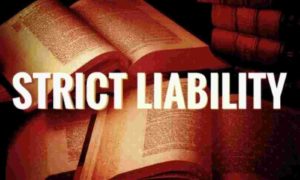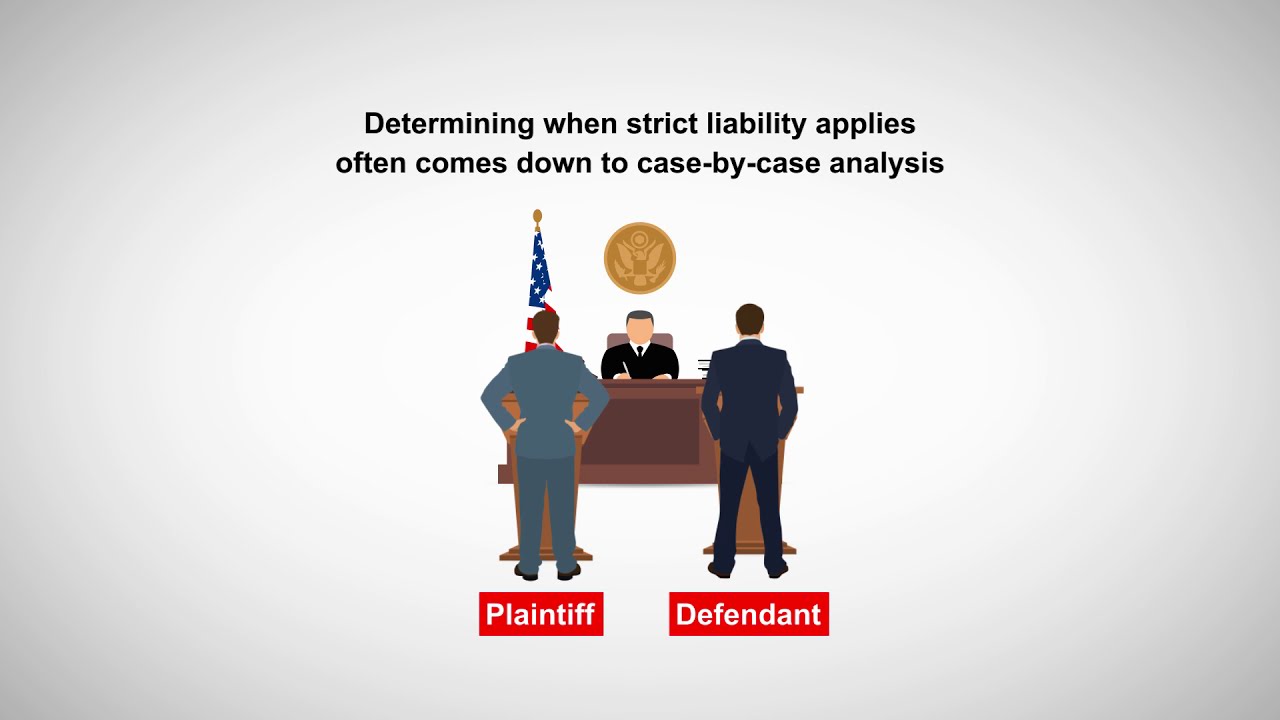History and Meaning of the Rule of ‘Strict Liability’
There are circumstances when a person may be held accountable for injury even if he was not negligent in creating it, or even if he had no intention of doing so, or even if he made some proactive attempts to avoid it. In other words, the law recognises ‘no fault’ responsibility on occasion. In this regard, it is worth noting the guidelines put out in two cases: first, the House of Lords’ judgement in Rylands v. Fletcher (1868) and, second, the Supreme Court of India’s decision in M.C. Mehta v. Union of India (1987).
The rule laid down in Rylands v. Fletcher is generally known as the ‘‘Rule of Strict Liability’. The House of Lords established the rule acknowledging ‘No fault’ responsibility in Rylands v. Fletcher in 1868. The responsibility recognised was ‘Strict Liability,’ which meant that even if the defendant was not negligent, or rather, even if the defendant did not want to damage or was cautious, he might still be held accountable under the rule.
In Rylands v. Fletcher, the defendant had a reservoir built on his land by independent contractors to supply water to his mill. There were ancient abandoned shafts under the reservoir’s location that the contractors failed to notice and hence did not shut. When the reservoir was full, the water broke through the shafts and swamped the plaintiff’s coal mines on adjacent property. The defendant was unaware of the shafts and therefore not negligent, despite the fact that the independent contractors were. Despite the fact that the defendant was not negligent, he was held accountable.
According to the rule, if a person brings a dangerous object onto his land and maintains it there, i.e., a thing that is likely to create mischief if it escapes, he is prima facie liable for the harm caused by its escape, even though he was not negligent in keeping it there. The liability arises not because of any fault or carelessness on the part of the individual, but because he kept something harmful on his property and it escaped and caused damage. The rule of Strict Culpability is named after the fact that liability arises in such a circumstance even if there is no fault on the side of the defendant.
Essentials for the Application of Rule of Strict Liability
The following three elements must be present in order for the rule of strict liability to be applied in any scenario:
(1) Someone must’ve brought something deadly into his property.
(2) Whatever a person has brought or stored on his property must be able to flee.
(3) The usage of land must be non-natural.
Dangerous Thing Brought on Land
The obligation for an item escaping from one’s land arises under this rule if the object gathered was a dangerous thing, i.e., a thing likely to cause harm if it escapes. The object so collected in Rylands v. Fletcher was a big body of water. Gas, electricity, vibrations, yew trees, sewage, flagpoles, explosives, toxic smells, and rusted wire have all been subjected to the regulation.
Escape of Dangerous Thing from Land
The entity causing the harm must also escape to a location outside the defendant’s occupation and control in order for the Rylands v. Fletcher rule to apply. Thus, if the branches of a toxic tree are projected onto the territory of a neighbour, this constitutes an escape, and if animals lawfully present on the neighbour’s land are poisoned by eating the leaves of the same, the defendant will be held accountable under the rule. The defendant, on the other hand, cannot be held accountable if the plaintiff’s horse crosses the border and dies from chewing the leaves of a deadly tree there because there is no escape from vegetation in this scenario.
Another example is Read v. Lyons & Co., where there was no escape and hence no culpability under the rule. The plaintiff worked at the defendant’s munitions factory at the time of the lawsuit. She was hurt when a shell that was being made on the defendant’s facilities burst while she was executing her responsibilities. The defendants here were not found to be negligent in any way. Despite the fact that the shell that burst was a dangerous object, the defendants were found not to be responsible since the object did not “escape” from the defendants’ premises, and so the rule in Rylands v. Fletcher did not apply.
Non-Natural Use of the Land
In Rylands v. Fletcher, water gathered in such a large quantity in the reservoir was deemed a non-natural use of land. ‘Natural usage’ refers to keeping water for everyday household uses. It “must be some specific use carrying with it heightened hazard to others, and must not simply be the typical use of land or such a use as is suited for the general benefit of the community” for the user to be non-natural.
The fire in a grate in a house is a usual, natural, normal, everyday usage of the fireplace in a room, according to Sochacki v. Sas. If the fire spreads to adjacent properties, the liability rule in Rylands v. Fletcher does not apply. Other instances of non-natural land use include electric wiring in a house or a shop, gas supply in gas pipes in a dwelling house, and water installation in a house.
Exceptions in the Rule of Strict Liability
Rylands v. Fletcher and subsequent cases have recognised the following exceptions to the rule:
(i) Plaintiff’s own default;
(ii) Act of God;
(iii) Consent of the plaintiff;
(iv) Act of the third party;
(v) Statutory authority
i.) Fault of the Plaintiff
In Rylands v. Fletcher, damage caused by the plaintiff’s own default was judged to be a fair defence. The plaintiff cannot sue for damages produced by his own entry into the defendant’s property. The plaintiff’s horse intruded into the defendant’s territory in Ponting v. Noakes and died after nibbling the leaves of a deadly tree there. The defendant was found not responsible because the horse’s trespass into the defendant’s land would not have caused the harm. The ruling in Rylands v. Fletcher did not apply to this case for another reason: there was no escape.

ii.) Act of God
Under the ruling in Rylands v. Fletcher, an act of God or vis major has also been deemed a defence to an action. If the escape was unexpected and occurred due to supernatural powers without human interference, the act of God defence might be invoked. Nichols v. Marsland is a wonderful example of a case where the defence was effectively pleaded. In that instance, the defendant dammed up a natural stream to construct artificial lakes on his property.
The stream and the lakes swelled to the point that the embankments built for the artificial lakes, which were sturdy enough for an average downpour, gave way, and the surge of water down the stream washed out the plaintiff’s four bridges. The plaintiff filed a lawsuit in order to recoup damages. The defendants were determined to be completely blameless. Because the accident, in this case, was caused by an act of God, the defendants were found not responsible under the rule in Rylands v. Fletcher.
iii.) Consent of the Plaintiff
The culpability under the rule Rylands v. Fletcher does not arise in cases of volenti non-fit injuria, i.e., when the plaintiff has consented to the buildup of the hazardous object on the defendant’s territory. When the source of hazard is for the ‘common advantage’ of both the plaintiff and the defendant, such consent is inferred. When two people live on separate levels of the same building, for example, each of them is presumed to have agreed to the construction of common-benefit items like the water system, gas pipes, or electric wiring.
Will the defendant be accountable for the escape of water gathered for the plaintiff and defendant’s mutual advantage unless he is negligent? This question was answered in the case of Carstair v Taylor where the plaintiff rented the bottom floor of a building from the defendant. The defendant himself lived on the top floor of the building. Water kept on the top floor leaked without the defendant’s knowledge or consent, causing damage to the plaintiff’s items on the bottom floor. The defendant was found not responsible since the water had been stored for the advantage of both the plaintiff and the defendant.
iv.) Act of a Third Party
The defendant will not be held accountable under this rule if the injury was caused by the act of a stranger who is neither the defendant’s servant nor under the defendant’s control. Thus, in Box v. Jubb, where the defendant’s reservoir overflow was caused by strangers obstructing a drain, the defendant was found not responsible. Similarly in Richards v. Lothian, outsiders obstructed the waste pipes of a washbasin that was otherwise under the defendants’ control and turned on the tap. The plaintiff’s products were harmed by the gushing water but the defendants were found not guilty of the charges.
If, on the other hand, the defendant foresaw or might have foreseen the stranger’s act and the harm could have been avoided, the defendant must take reasonable precautions to avoid the damage. He will be held accountable if he fails to prevent such harm.
v.) Statutory Authority
As previously stated, an act performed within the authority of legislation is a defence to a tort suit. When the action is under the rule in Rylands v. Fletcher, the defence is also accessible. When there is negligence, however, statutory authority cannot be used as a defence.
The defendant in Green v. Chelsea Waterworks Co. has a statutory responsibility to ensure a continuous supply of water. The plaintiff’s facilities were flooded with water after the main belonging to the firm ruptured due to the company’s carelessness. The corporation was found to be immune from liability since it was executing a statutory responsibility.

Strict Liability in India
The rule of strict liability is applicable as much in India as in England. There has, however, been an acknowledgement of some departure in both directions, i.e., in the extension and limitation of the norm of strict responsibility. In the event of a motor vehicle accident, culpability without fault has been recognised.
To a certain extent, the Motor Vehicles Act of 1938 recognises “responsibility without fault.” In the event of a motor vehicle accident, the recognition of “responsibility without fault” is a desirable step. In the event of motor vehicle accidents, the no-fault obligation to compensate the victim to the full amount of the damage sustained will be recognised in accordance with current demands, where the emphasis is on developing ways and means of compensating the tort victim.
It has been highlighted that the law recognises strict liability, or culpability without fault, under some circumstances. The Indian courts have recognised an exemption to the norm of strict liability in the case of large-scale water storage for agricultural purposes. The rationale for the exclusion is that, due to the unique conditions in India, storing such water may be required.
Landmark Judicial Precedents
Northwestern Utilities v London Guarantee and Accident Co [1936] A.C. 108
The appellants were a public utility corporation that transported high-pressure natural gas. A gas pipe ruptured during the municipal authorities’ sewer work, causing a fire that damaged the hotel insured by the respondents. The failure to do so was considered carelessness on the part of the appellants, and they were held accountable because the municipal authorities’ actions were visible and the threat to the gas pipelines could have been reasonably foreseeable and guarded against.
M.P. Electricity Board v Shail Kumar AIR 2002 SC 551.
In this instance, a 37-year-old man named Joginder Singh was riding his bicycle home from work on the night of August 23, 1997. A live electric line had snapped and was lying on the road. The rain had fallen, and the road had become half-flooded. The biker was unaware of the electric line, and when he came into touch with it, he perished instantly from electrocution.
The widow and small son of Joginder Singh filed a lawsuit against the M.P. Electricity Board. The Strict Liability rule was used, and it was determined that the Board had a legal obligation to provide energy in the region. The electric supplier will be held accountable if the energy so conveyed causes damage or death to a person who is unwittingly trapped in it. The current should have been shut off automatically if the electric cable was severed. Authorities in charge of such hazardous materials have a special responsibility to devise plans to avoid catastrophes.
The defence that the breakage of the wire was caused by a stranger attempting to steal the electricity was dismissed. The Electricity Board should have expected such an act, and at the very least, the appellant Board should have averted the repercussions of the stranger’s behaviour.
Madras Railway Co. v Zamindar [1974] 1 LA 364 (PC)
The owner of the property where such water is gathered is only accountable if he has not exercised sufficient caution. The breaking of two old tanks on the respondent’s zamindari resulted in the release of water in this case. These tanks, which had been there for a long time, were built not just for the defendant’s advantage, but for the benefit of thousands of his ryots as well. The fleeing water caused damage to the appellants’ homes, as well as the destruction of three railway bridges.
The ruling in Rylands v. Fletcher was not relevant in these circumstances, and because the zamindar was not careless, he was not accountable for the harm caused by the spilling water. The Privy Council absolved the defendant of its liability placing reliance on the peculiar Indian conditions which made it mandatory to store water.
FAQs
Which case laid down the Rule of Strict Liability?
The Rule of Strict Liability evolved through case laws and was first laid down in the case of Ryland v Fletcher.
If someone brings explosives or firecrackers on his property on Diwali, would that attract the Rule of Strict Liability?
Yes storing explosives would amount to bringing something dangerous on land and would also lead to non-natural use of the land. Therefore it would require the person to take special care and would attract the Rule of Strict Liability.
If a person trespasses someone else’s land and gets bitten by a snake that was kept on land, would that make the person liable for Strict Liability?
No, in this case, there has been no escape of the dangerous thing from the land the plaintiff was at fault himself as he trespassed the property. Hence the rule of strict liability would not apply.
If a water system has been installed in a building for the common benefit of the residents of the building and there is an overflow of this water, can anyone be liable?
No, in this case, there is consent of all the members of the building for the common benefit and hence no liability can arise thereby discarding the application of the Rule of Strict Liability.
If a farmer stores large scale water on his land for irrigation purposes and there is an overflow of that water causing damage to the neighbour’s property, can the Rule of Strict Liability be made applicable?
Indian Courts taking into account the peculiar Indian conditions have carved out an exception to the Rule for water being stored for agricultural purposes. The Courts have said that the conditions of India compel a farmer to store large-scale water on the land for agricultural purposes and therefore the Rule of Strict Liability won’t apply.
